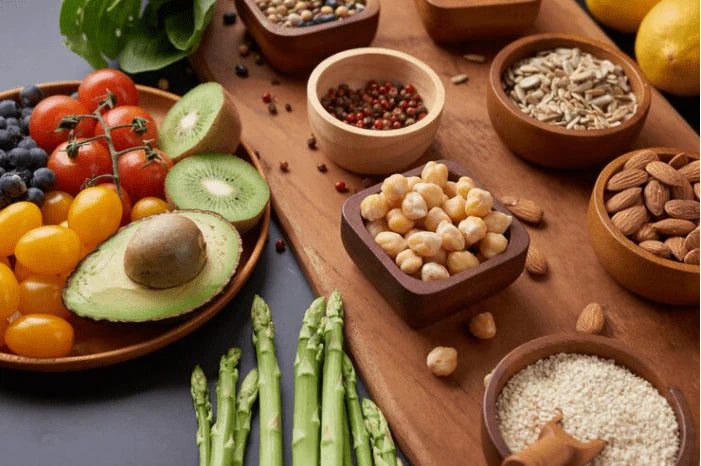
The benefits of plant proteins

What are plant proteins?
It's well known that protein is the heart of any athlete's diet. Well, plant-based protein is also essential, and you should seriously consider it. So, what exactly is plant-based protein? In short, it's nature's treasure trove to keep our muscles in tip-top shape and our bodies in super-athlete mode. It's mainly found in plants like vegetables, legumes, nuts, seeds, and even some grains.
These proteins are essential for your recovery after intense training and for muscle growth. They're a source of pure power for your athletic performance. But be careful, they're also much more than that! Plant-based proteins are generally lower in saturated fat than animal proteins, which is great for your cardiovascular health. They're also loaded with fiber, vitamins, and minerals, which will boost your energy, focus, and overall well-being.
So, plant-based protein is the key to becoming a stronger, healthier athlete. Don't underestimate its power. Now that you know what it is, let's explore why you need it to shine on the field, track, or in the gym.
Why do we need it?
Well, imagine your muscles as racing engines, and plant-based protein is the premium fuel that keeps them running at full speed. It's made up of amino acids, the basic building blocks of protein, which are essential for muscle repair and growth. As an athlete, you put intense strain on your muscles during every workout, creating tiny tears. Plant-based protein then steps in like repair workers, rebuilding your muscle fibers stronger than before, which is what allows you to increase your strength.
In addition to promoting muscle growth, plant-based protein plays a key role in regulating your metabolism, helping you burn fat and maintain a healthy weight. It's also crucial for your immune system, helping you stay in tip-top shape even when you're pushing your body to the limit. So, remember this: plant-based protein is the fuel for your muscles, the gatekeeper for your metabolism, and the shield for your immunity.
The difference between animal and plant proteins
Protein is essential, that's a fact, but there are two main sources to consider: plant-based protein and animal-based protein. Animal protein, which you find in foods like meat, fish, eggs, and dairy, is often considered a complete protein source. This means it provides all the essential amino acids your body needs. It's therefore effective for muscle building and recovery.
On the other hand, plant-based proteins, found in foods like beans, lentils, nuts, and tofu, are generally considered incomplete protein sources. However, a protein cannot be either complete or incomplete: it must contain all 8 essential amino acids, i.e., those that the body does not produce. The 8 amino acids in question are:
- Valine
- Leucine
- Isoleucine
- Threonine
- Methionine
- Lysine
- Phenylalanine
- Tryptophan
On the other hand, it's true that plant-based proteins contain less lysine and methionine than animal-based proteins. For your information, lysine helps support the immune system and bones, while methionine plays a role in protein synthesis and protects the liver. You can therefore supplement your diet with Omega-3 to strengthen your immune system and reduce joint inflammation.
For example, 100 grams of cooked chicken provides between 30 and 35 grams of protein. You can substitute it with 200 grams of firm tofu or 350 grams of cooked lentils to get the equivalent protein.
Additionally, plant-based proteins are often lower in saturated fat, cholesterol, and calories compared to animal proteins. They're rich in fiber, vitamins, minerals, and antioxidants, which is great for your overall health. Plus, their production often has a lower environmental impact than animal proteins. Ultimately, the main difference lies in the source and composition of the protein, but by making smart choices, you can seamlessly integrate plant-based proteins into your athletic diet.
What are the most protein-rich foods?
Plant-based proteins have become an increasingly popular option for those looking to adopt a more balanced and environmentally friendly diet. They're not only good for you, but also for the planet. To help you plan your plant-based protein diet, we've compiled a list of foods that are true protein powerhouses. Check out the table below to discover plant-based foods that provide a healthy dose of protein while offering a variety of health benefits.
|
Food (100g portion) |
Protein content (in g) |
|
Seitan |
25 |
|
Almonds |
20 to 23 |
|
Tofu |
15 to 20 |
|
Lentils |
9 |
|
Quinoa |
4 to 5 |
Some recipe ideas with plant-based proteins
You can easily incorporate plant-based protein into your diet by making simple, delicious recipes. Here are a few:
Chia Seed Porridge
- In a glass, place: 2 tablespoons of cottage cheese, 1 tablespoon of chia seeds, a little milk and agave syrup according to your preferences.
- Leave to rest overnight in the refrigerator
- Enjoy with pieces of fruit of your choice for added flavor.

Savory waffles with coral lentils and feta
- Cook 250g of coral lentils and let cool
- Add 1 egg to the lentils, then 80g of plant-based yogurt, 80g of flour and ½ tablespoon of yeast
- Mix until you obtain a smooth paste.
- Crumble 80g of feta and incorporate it into the dough, mixing briefly with a spoon.
- Oil the waffle iron then place 1 tablespoon of batter on each side
- Cook for about 2 minutes 30 seconds and enjoy!
